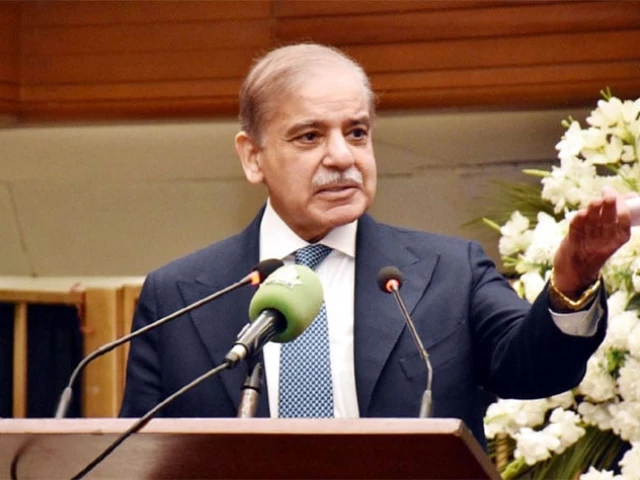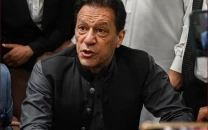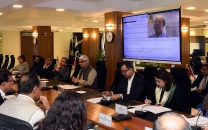Pakistan, India talks may be held in UAE or Saudi Arabia: PM Shehbaz
Speaking to senior journalists, the PM firmly stated that Pakistan had not requested a ceasefire

Prime Minister Shehbaz Sharif said on Wednesday that peace talks between Pakistan and India could take place in Saudi Arabia or the United Arab Emirates (UAE), with the United States acting as a key mediator.
Speaking to journalists in Islamabad, the prime minister firmly stated that Pakistan had not requested a ceasefire during the recent conflict. "If we had done so, the international community would have known," he said.
He further said that an agreement was reached during communications between the Directors General of Military Operations (DGMOs) of both countries that their respective forces would return to pre-war positions.
The premier confirmed that Pakistan's delegation at the talks would include the National Security Adviser and the Director-General of the Inter-Services Intelligence (ISI).
Recalling the fighting in Pasrur, the Prime Minister said that Pakistani forces held their ground despite heavy losses.
“Our soldiers stood firm and did not retreat, even when one soldier and eight civilians were martyred at the checkpoint. They fought to the last man and did not abandon their post.”
When asked whether Israeli personnel were present in India during the conflict, Shehbaz Sharif said, “There are reports suggesting that Israelis were in India. Israel provided extensive support to India during the war, but despite that, we emerged victorious.”
“The Army Chief led the war on behalf of all armed forces. We prayed and fought—and we won,” he added.
PM Shehbaz recounted a late-night phone call from the army chief warning of imminent Indian aggression. “At 2:30 AM, he called me in anger, saying India was preparing to strike. I told him: we have no problem—respond and move forward.”
He added, “We gave a powerful reply to a country five times our size in economic and defence capacity. India saw itself as the region’s police officer — we shattered that arrogance. We fought solely to defend our homeland, seeking only the pleasure of God.”
The prime minister said he had publicly offered an investigation into the Pahalgam attack during a speech at Kakul Military Academy, stating that Pakistan had no involvement. “The world accepted our position and our neutral offer.”
He claimed India initiated the conflict, and in response, Pakistan destroyed six Indian aircraft, downed drones, and even targeted India’s S-400 air defence system. “We could have shot down more planes but exercised restraint.”
Prime Minister Shehbaz Sharif said Pakistan had made full use of Chinese technology during the recent conflict and joked that the country had become a "marketing nation for China" globally.
He also praised China for standing firmly with Pakistan and acknowledged the strong support received from Turkiye, Saudi Arabia, the UAE and Azerbaijan.
Responding to a question about why members of the opposition party Pakistan Tehreek-e-Insaf (PTI) were not included in foreign delegations, Shehbaz said, “These delegations are government-level missions. After the comments made by some PTI figures on Indian TV channels, can we take that risk?”
Pakistan-India standoff
The latest escalation between Pakistan and India began on April 22, when an attack in the IIOJK resort town of Pahalgam killed 26 people. India immediately blamed Pakistan for the incident, despite providing no public evidence.
In response, India undertook a series of hostile actions the next day on April 23, including suspending the 65-year-old Indus Waters Treaty (IWT), cancelling visas for Pakistani citizens, closing the Wagah-Attari border crossing, ordering the shutdown of the Pakistan High Commission in New Delhi, and reducing diplomatic staff at each other's embassies.
Pakistan strongly rejected the accusation, calling it unsubstantiated, but took reciprocal measures through its National Security Committee (NSC). These included halting trade with India, closing Pakistani airspace to Indian aircraft, and other countersteps.
Tensions further escalated in the early hours of May 7, when missile strikes hit six cities in Punjab and Azad Jammu and Kashmir (AJK), destroying a mosque and killing dozens of civilians, including women, children, and the elderly.
In a swift military response, Pakistan’s armed forces shot down Indian warplanes, including three Rafale jets, widely regarded as a key asset of the Indian Air Force. Over the following two days, India launched waves of Israeli-made drones, which were also neutralised by Pakistan's military.
The confrontation intensified again in the early hours of May 10, when India targeted several Pakistani airbases with missile strikes. In retaliation, Pakistan launched Operation Bunyanum Marsoos, damaging Indian military installations, including missile storage sites, airbases, and other strategic targets.
By Saturday evening, US President Donald Trump announced that a ceasefire had been reached following intense diplomatic efforts overnight. Minutes later, the agreement was confirmed separately by Pakistan’s Foreign Minister Ishaq Dar and the Indian foreign secretary.
But despite the military ceasefire the war of narratives has waged on.
While Pakistan publicly credited US President Donald Trump — along with China and Gulf states — for playing a vital role in defusing tensions, India downplayed foreign involvement. Indian officials have insisted the truce was the result of direct bilateral talks.
Trump, has however, reiterated his stance twice following the initial announcement.
























COMMENTS
Comments are moderated and generally will be posted if they are on-topic and not abusive.
For more information, please see our Comments FAQ